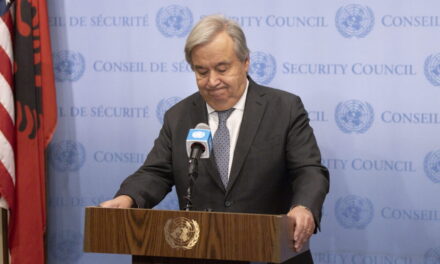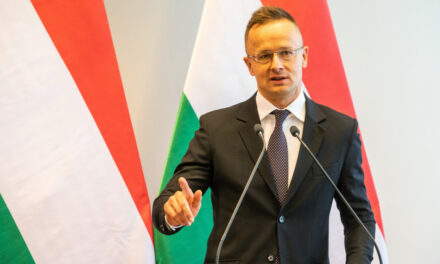The temporary suspension of US aid to Ukraine raises serious questions. Primarily, how Europe can replace the United States if it permanently withdraws from its own proxy war. The short answer is no way.
A huge panic broke out over the money and weapons aid to be sent to Ukraine. The political chaos raging in the USA culminated in the ousting of the Republican Speaker of the House of Representatives. Republican representative Matt Gaetz, who initiated the firing of his own party colleague, clearly indicated that McCarthy sought an agreement with the Democrats in order to continue disbursing aid to Ukraine.
The $6 billion in aid to our northeastern neighbor has been withdrawn from the current transitional budget valid until mid-November, and there is a very real chance that it will either stop completely, or that its amount will be reduced to such an extent that it will become practically symbolic. While Biden has tried to confidently assure Kiev that he will keep the war going, in reality he is practically begging Republicans not to prevent it from continuing by shutting off the money spigots.
Is there a way back?
The answers are more and more pronounced. The top Republican on the Senate Foreign Relations Committee, Jim Risch, and the chairman of the House Foreign Affairs Committee, Michael McCaul, responded to the president in a joint letter, in which they said:
“Your administration has failed to articulate a strategy that outlines how US assistance to Ukraine will help it win over Russia while advancing and promoting American interests.
The promise that we will support Ukraine "as long as necessary" is not a strategy.
At the first signs of congressional chaos, the Western liberal mainstream media (as if it knew in advance that there would be big trouble) began to publish articles in a row that expressed red exclamation marks towards Europe, saying: if the USA suspends aid to Ukraine, then the The EU must provide more money and weapons to Kiev. That's what won't work.
Washington checks Brussels
Confusion among EU leaders was palpable at the Granada summit of the European Political Community organized in the first week of October. Only the Ukrainians try to trivialize the stoppage of American aid, but the European politicians could no longer identify with the usual "we want it this way, so it will be this way" diplomacy.
Josep Borrell, the EU's high representative for foreign affairs, openly stated: Europe cannot take the place of the USA in the support system, and cannot alone finance keeping Ukraine on ventilators and the continuation of the war.
"Anyone who doesn't want Putin to win this war is hoping that the United States will reconsider and continue to support Ukraine. If this does not happen, Europe cannot replace the USA. His absence will be irreplaceable"
he said gloomily.
Similarly, Ursula von der Leyen, who perhaps for the first time since her reign, seemed completely bewildered. As he said, the EU is just now preparing to vote 50 billion euros in a four-year demolition to Kiev, but it will be insufficient to run the Ukrainian state if the United States really withdraws from its own proxy war.
We told you in advance
As a matter of fact, the 50 billion EU budget surplus is still malleable. The Hungarian government has indicated several times that it does not support the plan, and finally (after many ineffective threats), Brussels is now trying to influence our country by transferring 13 billion euros from the frozen, but legitimate, catch-up support amount.
However, this is no guarantee that Viktor Orbán will agree to increase the EU budget. According to his new proposal, the four-year aid to be sent to the Ukrainians should be split in two and a "mid-term" review of its use should be held in 2025, followed by another member state vote on the transfer of the next installments. Kiev expects about $43 billion in aid in 2024, most of which will come from the United States – but as things stand, it is indeed conceivable that Europe will be left alone.
And speaking of Ukrainian aid from the Hungarian perspective: seeing the current absurd and chaotic situation, the words of Péter Szijjártó, who said in the opening lecture of the Budapest Peace Forum at the beginning of June: Europe made a huge mistake by trying to compete with the USA Regarding arms aid to be sent to Ukraine. As he put it:
"To compete with the world's number one military superpower in terms of who can provide greater military assistance to a third party is an incomprehensible decision in itself. The war is taking place here in Europe, European people are dying, the effects are most severe here, yet a seriously dangerous spiral has developed in this illogical competition. At the meetings of the EU foreign ministers, there is a compulsion to prove that our aid is competitive, while we know exactly how much military potential the USA has. It all leads to the war dragging on even more, and the longer it drags on, the more people die."
As things stand now, if the US pulls out of the war that is practically being waged because of it, the leaders of the European Union will have to ask the most serious questions: not only to Washington, but also to themselves.
Mandiner / Ákos Béla Révész
Featured image: MTI/EPA/Ukraine Presidential Press Service













